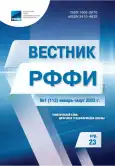Создатели нового в образовании
- Авторы: Бороненко Т.А.1, Куркин С.А.2, Миронов В.В.3, Левицкий М.Л.4, Рубцов В.В.5
-
Учреждения:
- Ленинградский государственный университет имени А.С. Пушкина
- Центр технологий компонентов робототехники и мехатроники Университета Иннополис
- Сыктывкарский государственный университет имени Питирима Сорокина
- Российская академия образования
- Московский государственный психолого-педагогический университет
- Выпуск: Том 113, № 1 (2022): ТЕМАТИЧЕСКИЙ БЛОК: ЦИФРОВАЯ ТРАНСФОРМАЦИЯ ШКОЛЫ
- Страницы: 122-133
- Раздел: Тематический блок
- URL: https://journal-vniispk.ru/1605-8070/article/view/304601
- DOI: https://doi.org/10.22204//2410-4639-2022-113-01-122-133
- ID: 304601
Цитировать
Полный текст
Аннотация
Предсказать будущее образования невозможно. Его можно совместно создать с опорой на возникающие гуманитарные, коммуникативные технологии и другие достижения современной цивилизации. Через 440 лет после великого Яна Коменского мы делаем следующий шаг, создавая новую науку об учении: цифровую матетику и цифровую дидактику.
Авторы учебников, живых своими связями с цифровыми средствами, направленными на овладение человеческой деятельностью, и профессора вузов, отталкиваются от опыта своего детства, базируются на достижениях человечества, осознают и формируют возможности и потребности будущего в настоящем. Наука получает возможность изучать ускоряющиеся процессы эволюции образования и анализировать большие данные, отображенные в многообразных цифровых платформах.
Мировое образовательное сообщество становится источником опыта критически важных решений и прямого педагогического взаимодействия. Ослабляются географические и языковые барьеры.Лидеры общества, государства и бизнеса получают возможность реализовать свое видение в конкретном проекте, а цифровые технологии открывают доступ для участия в проекте всем, кто поддерживает гуманистическую идею в нашем трансформирующемся мире.
Об авторах
Татьяна Алексеевна Бороненко
Ленинградский государственный университет имени А.С. Пушкина
Автор, ответственный за переписку.
Email: kafivm@lengu.ru
Профессор
Россия, 196605, Россия, Пушкин, Петербругское ш., 10Семен Андреевич Куркин
Центр технологий компонентов робототехники и мехатроники Университета Иннополис
Email: kurkinsa@gmail.com
Россия, 420500, Россия, Татарстан, Иннополис, Университетский б-р, 1
Владимир Валерьевич Миронов
Сыктывкарский государственный университет имени Питирима Сорокина
Email: mironov_v@list.ru
Россия, 167001, Россия, респ. Коми, Сыктывкар, Октябрьский пр-т, 55
Михаил Львович Левицкий
Российская академия образования
Email: oped-rao2017@mail.ru
Профессор, академик РАО
Россия, 119121, Россия, Москва, ул. Погодницкая, 8Виталий Владимирович Рубцов
Московский государственный психолого-педагогический университет
Email: rubtsovvv@mgppu.ru
Профессор, академик РАН
Россия, 127051, Россия, Москва, Сретенка, 29Список литературы
- J. Xu, B. Zhong Comput. Hum. Behav., 2018, 81, 340. doi: 10.1016/j.chb.2017.12.037.
- А.В. Гриншкун В Информатизация образования и методика электронного обучения: цифровые технологии в образовании: Мат. V Межд. науч. конф. (РФ, Красноярск, 21–24 сентября 2021), Ч. 1, под ред. М.В. Носкова, РФ, Красноярск, СФУ, 2021, с. 120–124. (https://conf.sfu-kras.ru/DTE-2021/proceedings).
- Т.А. Бороненко, А.В. Кайсина, И.Н. Пальчикова, Е.В. Федоркевич, В.С. Федотова Теоретические основы построения концептуальной модели понятия «цифровая грамотность»: Монография, РФ, Санкт-Петербург, ЛГУ им. А.С. Пушкина, 2021, 230 с. (https://rffi.1sept.ru/file/2021/11/14f27d31-149d-4a0d-bb90-83cbfd342a5d.pdf ).
Дополнительные файлы









